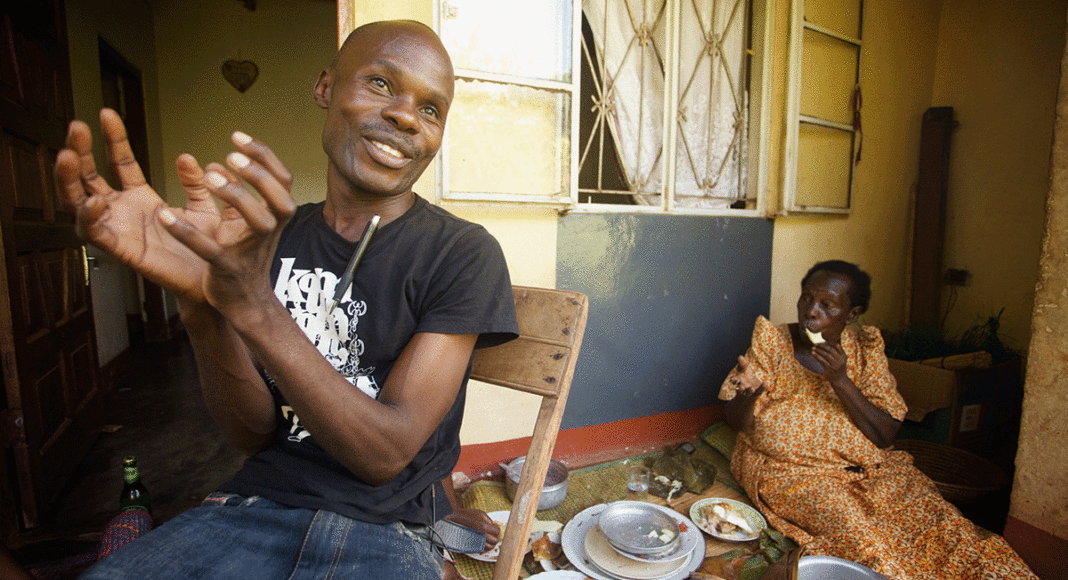On March 1, 2014, the Red Pepper published a two-page spread titled “Ugandan Homos Cabinet List Leaks.” On the top left corner appeared a photo of John “Long Jones” Wambere, with his characteristic shoulder-length dreadlocks, high cheekbones and something between a grimace and a small, serene smile.
It wasn’t the first time his photo was printed in the Ugandan tabloid. The same paper had outed him as a gay man in 2005 by printing a photo, his home address, private information, and identifying details—an act that has become commonplace in the years leading up to the Anti-Homosexuality Act passed by the Ugandan Parliament in December 2013.
The 2014 Pepper article came out while Wambere was in the U.S., shortly after Ugandan President Yoweri Museveni had signed the bill into law. This time, it was a clear sign that Wambere could not return home.
The Anti-Homosexuality Act made same-sex relations punishable by life in prison (a previous draft included a death penalty clause), and in the months following the bill’s enactment, lynching, mob violence, blackmail, lost jobs, burning of homes, evictions, and suicides increased tenfold, according to Sexual Minorities Uganda.
“It became very scary,” says Wambere, who remembers growing up in a time when men would hold hands as a sign of brotherhood. “You cannot live every day having sleepless nights. You cannot live every day unguaranteed of your safety.”
Wambere now lives in Boston, having gained asylum in 2014, and is featured in the documentary Call Me Kuchu, which screens at Aptos’ Temple Beth El on July 18. Wambere will attend the screening along with activist David Robinson, an American who also lived in Uganda in the tense years leading up to the law’s passage, and who was also outed as gay by the Red Pepper.
Even though the Constitutional Court of Uganda ruled the law invalid in August 2014, as a gay man living in what has become known as “the worst place to be gay,” Wambere says he was ostracized, harassed, threatened and brutalized.
After the United States Supreme Court legalized same sex marriage on June 26, many have asked where the nationwide LGBTQ movement should focus next. “Africa,” says Robinson.
“As Americans, we need to look out for our brothers and sisters around the world,” says Robinson. “We have a degree of equality now, a degree of safety, but it’s not the case in so much of the world—it’s not ours to do, it’s the Ugandans’ to do, but we have some owning up to do.”
“Owning up,” he says, because homophobia in Uganda is an American export. Before the radical American pastor Scott Lively arrived in Uganda in 2009, he helped pass America’s first anti-gay legislation in 1992. Lively’s rhetoric found a captive audience in Uganda: after attending one of his seminars, the Minister of Finance for Planning, David Bahati, proposed the Anti-Homosexuality bill.
“Lively just took our cultural garbage and took it abroad,” says Robinson, who remains committed to the Ugandan LGBT movement after returning to Portland, Oregon.
Ugandans listened to Lively (who now faces a federal lawsuit on counts of human rights violations) because they listen to their churches, says Wambere—largely because churches are the main provider of services during times of strife, especially during the HIV/AIDS epidemic.
“The law took us by storm, it wasn’t something we were prepared for because generally Ugandans are very tolerant, they love their families, they are humble people,” says Wambere.
Gay Ugandans have a right to live without fear, but even amongst friends, mistrust is so inescapable that when he watched Call Me Kuchu (kuchu is the word for LGBT Ugandans) Wambere says he heard stories that he’d never heard before.
Call Me Kuchu focuses primarily on the underground LGBT movement in Uganda, and on the “father” of the movement, David Kato, the first openly gay man in the country, who was murdered one year into filming. The Ugandan government initially claimed that his death was related to a robbery gone wrong, then later claimed a personal dispute. But Kato’s funeral made international headlines when the presiding pastor used it as an opportunity to “preach hate,” Wambere says, making comparisons to Sodom and Gomorrah in his sermon.
The film follows Kato’s friends and allies as they seek a new way forward under the prospect of the Anti-Homosexual Act. It also shows a fierce and unrelenting movement brazenly defying the nascent homophobia in their home country. Since its 2012 release, Kuchu has won the GLAAD Award for Outstanding Documentary, Best Documentary at the 2012 Berlin Film Festival, and the 2013 Cinema for Peace Human Rights Film Award.
Filmmakers Katherine Fairfax and Malika Zouhali-Worrall were invested in the community, says Wambere. They didn’t just travel to Uganda as Westerners, get the story, make the movie, and leave.
Even if he misses home, Wambere says he finally feels free in the U.S.
“I didn’t want to live a lie, it took me time to grow and come to terms with my sexuality,” says Wambere. “I always thought it was something that would go away and as time went on I began to love myself—I got that pride in being who I am.”
Info: David Robinson will give a talk at the Ocean Gate Zen Center at 9 a.m., on Saturday, July 18. ‘Call Me Kuchu’ will be screened at Temple Beth El 7 p.m. July 18.












